LONDON — Britain looks set to witness the final chapter this weekend of an underdog story that arguably outshines even the 1980 “Miracle on Ice.”
Leicester City — a pro soccer team built on a shoestring budget, and hailing from an unfashionable city in central England — can clinch the British Premier League on Sunday with a win over 13-time champions Manchester United.
Before the season began, they were 5,000-to-1 longshots to win the title.
Within this fairy tale, there are remarkable undercurrents: The star goal-scorer who previously worked in a factory after being told he wasn’t good enough; the coach who returned to England after being unceremoniously dumped by a big-money rival; the team that built a title-winning side by spending a fraction of its Arab and Russian-backed challengers.
“The whole season has been absolutely unbelievable,” said 53-year-old Leicester fan Chris Seaton, who attended to his first game in 1974. “I don’t know what I would compare it to, but lots of people are calling it the greatest sporting story ever.”
From Last to First
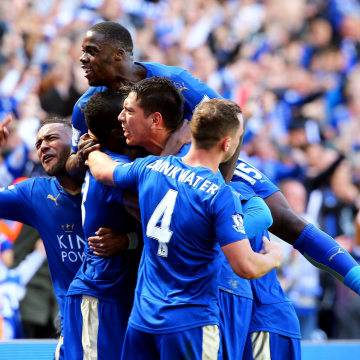

Leicester — pronounced “LESS-TER” — was never supposed to be a contender for one of the most prestigious competitions in the soccer world.
The Premier League is the most-watched domestic soccer competition on the planet, with a total of 4.7 billion global TV viewers last season. A television deal worth some $7.75 billion will kick in next year, to be shared among the clubs depending on where they rank.
The price of failure is high; the last three of the league’s 20 teams get demoted to the far-less-opulent second tier of British soccer.
Such a fate looked almost certain for Leicester last season. The Foxes — the club’s nickname — were in last place from November until April and looked certain to be relegated after a year of promising performances but poor results.
Somehow, a rallying run in the final six weeks kept the team afloat and secured another season in the top league.
Another setback came months later in June, however, when head coach Nigel Pearson was fired after relations broke down with the club’s Thai owners.
Weeks before, Pearson’s son was one of three Leicester players whose contracts were terminated after The Sun on Sunday newspaper published a videotape appearing to show the trio involved in an orgy while on tour in Thailand. Some of the players could be heard directing racial slurs at their female companions.
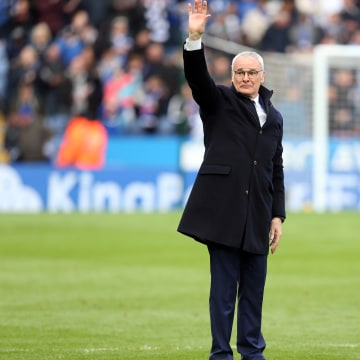

Replacing Pearson was Claudio Ranieri, a polite 64-year-old Italian whose appointment was unpopular among most supporters. Though experienced, with stints at Italian giants Juventus and Inter Milan, he was known in English for being fired by Chelsea in 2004 after Russian billionaire Roman Abramovich bought the club.
He also endured the ignominy of being let go by the Greek national team in Nov. 2014 after a humiliating defeat by the Faroe Islands, a Danish archipelago with a population of less than 50,000.
Ranieri’s previous teams towered above Leicester in terms of sporting success, but many fans felt his mild-mannered style was not the pugilistic approach needed to keep their heads above water.
“To say he is hit-and-miss is an understatement — he is mainly miss,” former Leicester player Steve Claridge told the Leicester Mercury following Ranieri’s appointment.
“I was totally skeptical,” admitted Andy Ford, a 41-year-old supporter who runs an electronics shop in Louth, a town 70 miles to the northeast. Like all Leicester fans, he is now a Ranieri acolyte.
“He has been simply brilliant,” said Ford, who was born and bred in Leicester and has supported the club since he was aged five. “You can see the team spirit he’s created on the field, they’ve bonded.”
Converting the Doubters
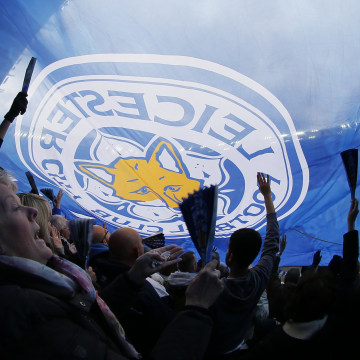

The club’s strong start this season was initially passed off as an oddity, a Cinderella run destined to crumble with the arrival of British winter.
Sports radio shows were replete with callers praising, somewhat patronizingly, how refreshing it was to see a successful team other than the traditional nobility of Manchester United, Chelsea, Manchester City, Liverpool and Arsenal.
With no salary cap and no draft system, the Premier League is more akin to a free-market economy, a Wild West where clubs can spend with near impunity.
Leicester’s first team cost just under $24 million, according to Transfermarkt, a German website that tracks soccer transfers and other statistics.
By contrast, Manchester City — owned by Ermerati billionaire Sheikh Mansour bin Zayed Al Nahyan — spent almost three-and-a-half times that amount on just one player last summer: around $84 million for Belgian midfielder Kevin De Bruyne.
Not only are the club’s finances dwarfed by others, the city of Leicester itself is regarded by outsiders as something of a boondocks in England’s Midlands region.
Bombed during World War II, it is less than 90 miles northwest of London but feels a world away from the thriving global capital.
“It’s a bit of a humdrum town that was beaten up by planners after the Second World War,” said Seaton, who has moved to the southern seaside town of Bognor Regis.
The city gained some international recognition when the body of Richard III, a 15th-century English king, was discovered under a municipal parking lot in 2012, some 527 years after he was slain in battle. Superstitious fans noted that the monarch’s ceremonial reburial in March last year came at exactly the same time the team experienced a dramatic upsurge in results.
Nevertheless, Leicester is often overshadowed by its larger neighbor Birmingham, which has undergone significant regeneration in recent years, and more well-known places, such as Liverpool and Manchester, are able to attract high-earning foreign soccer starts with promises of a glamorous life in a metropolitan city.
But on the field these cities have been no match for Leicester.
The Vardy Effect
While not always pretty, the club’s playing style has centered around launching fast counter-attacks spearheaded by its jet-heeled forwards, Riyad Mahrez and Jamie Vardy.
Mahrez, a 25-year-old Algerian, was bought for just over $500,000 in 2014. Last week he became the first African to win the Premier League’s player-of-the-year award.
But it is 29-year-old Englishman Vardy who has captured the nation’s attention.
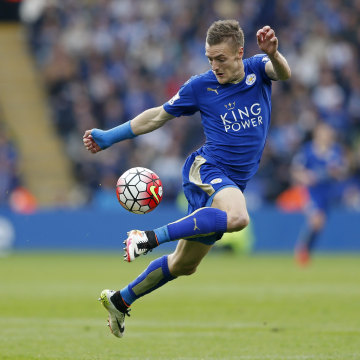

The son of a crane operator, Vardy was rejected by second-tier Sheffield Wednesday when he was 16. He resorted to playing in the eighth-lowest division of English football, working in a carbon-fiber factory to supplement his income.
In 2007, he was convicted of assault and had to play while wearing an electronic tag round his ankle while observing a 6 p.m. curfew for six months. He said the charge came after he defended a deaf friend in a bar who was being mocked because of his hearing aid.
“I wasn’t going to stand there and let him take a beating,” he told Sheffield’s The Star newspaper, describing the ensuing altercation.
A run of goals earned Vardy three transfers in three years, the last of them to Leicester for the modest fee of $1.4 million in 2012.
This season he has been unrelenting, scoring 22 goals in 35 games and eviscerating even the most experienced defenders. In November he became the first person to score in 11 consecutive games since Blackpool’s Stan Mortensen in the 1950-51 season.
“He’s been just ridiculous,” said Ford.
The striker’s time at the club has not been without controversy. In August last year, just before his team’s miraculous season began, he was fined by his club and forced to apologize after The Sun on Sunday published a video appearing to show him making a racial slur in a casino.
It’s these highs and lows that piqued the interest of British screenwriter Adrian Butchart, the man behind the “Goal!” movies. According to reports in the British press, the pair have met up to discuss a film about the striker’s rags-to-riches life.
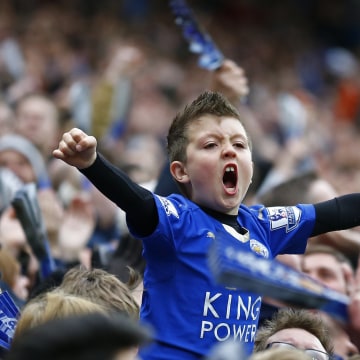

Naysayers and killjoys point out that Leicester’s points total of 76 would have fallen short in previous campaigns. Just as Leicester have ascended this year, the league’s typical favorites have misfired in unison.
None of that will matter if the team beats Manchester United on Sunday. If that happens, the players will return to the King Power Stadium, their home turf, on May 7 to play Everton and lift the trophy.
Most of the 32,000 fans inside that venue will know this will likely never happen again. Few will care.



